|
|
| Sei in: Cinema e Medioevo ® Indice alfabetico dei film |
Agni Varsha
2002, regia di Arjun Sajnani
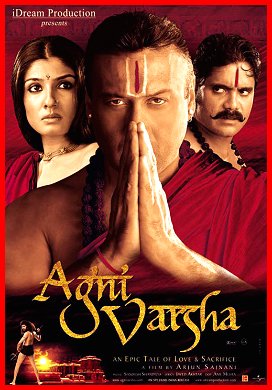
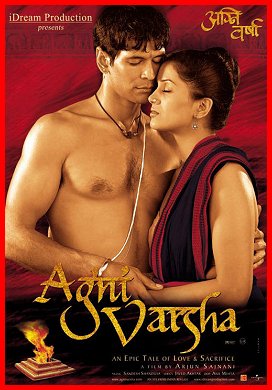
Scheda: Nazione: India - Produzione: Sunny Films, iDream Productions - Distribuzione: Singa Home Entertainment, CMV Laservision, Cinebella Entertainment - Soggetto: basato sulla commedia The Fire and the Rain di Girish Karnad - Sceneggiatura: Arjun Sajnani, T. Jayashree, Anil Mehta - Dialoghi: Atul Tiwari - Fotografia: Anil Mehta - Montaggio: Jabeen Merchant - Art Direction: Shashi Adappa - Costumi: Rukmini Krishnan, Leena Singh - Musiche: Sandesh Shandilya, Taufiq Qureshi - Effetti speciali: Western Outdoor - Formato: Color, linguaggio Hindi - Durata: 130'.
Cast: Amitabh Bachchan, Jackie Shroff, Kumar Lyengar, Raveena Tandon, Nagarjuna, Ashfaq Rauf, Milind Soman, Sonali Kulkarni, Gopal Piplani, Prabhu Deva, Tarun Kapoor, Raghuveer Yadav, Mohan Agashe, Veena Sajnani, B. G. Sandeep, Zul Vellani, Amog, Nikita, Dipti Bhatnagar, Khalid, Gopi Krishna, Sri Kumar, Gohul V B Nair, Pradeep, Pradeesh, Rajeev, Anil Ram, Sameem Rizvi, G Shankar Rao, Deepti Sudhendra.
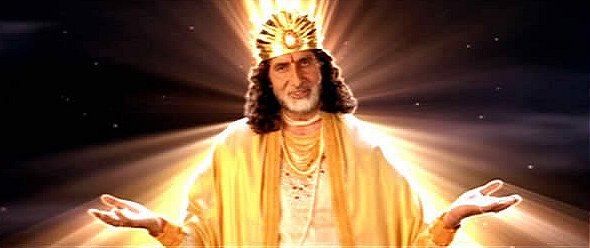
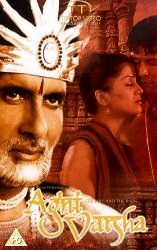
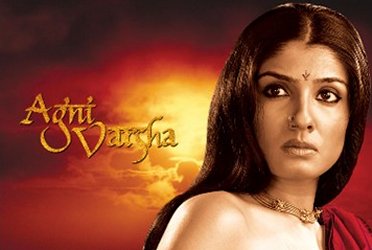

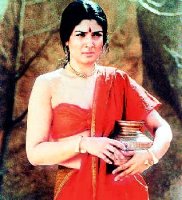
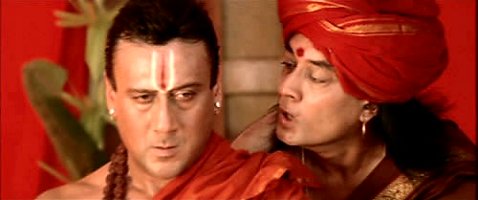
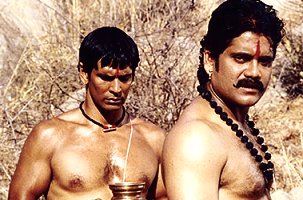
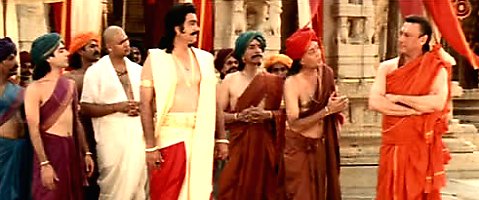
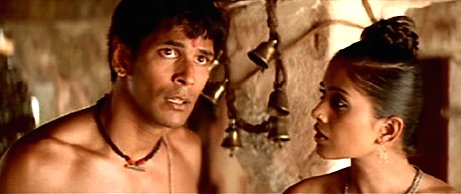
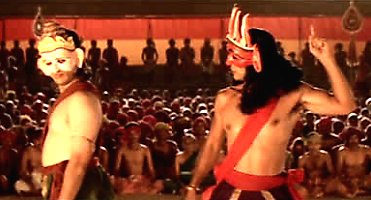
![]() Trama e commenti:
screenweek.it
-
cinema.tipiace.it
-
screenweek.it: «Il film racconta la
storia dell'incompreso Arvasu (Milind Soman) che è riuscito a diventare un
attore. è innamorato di Nittilai
(Sonali Kulkarni) che ricambia il suo amore ma cerca l'approvazione di suo padre
e dei vecchi del villaggio prima di sposarlo...».
Trama e commenti:
screenweek.it
-
cinema.tipiace.it
-
screenweek.it: «Il film racconta la
storia dell'incompreso Arvasu (Milind Soman) che è riuscito a diventare un
attore. è innamorato di Nittilai
(Sonali Kulkarni) che ricambia il suo amore ma cerca l'approvazione di suo padre
e dei vecchi del villaggio prima di sposarlo...».
![]() Plot Summary, Synopsis, Review: IMDb
-
allmovie.com
-
rottentomatoes.com -
nytimes.com
-
rediff.com
-
bollywoodhungama.com
-
planetbollywood.com
-
apunkachoice.com
-
jaman.com
-
kaminey.net
-
moviemania.ws
-
uiowa.edu:
«This strange, spectacular film returns to the mythological roots of Hindi
cinema, via a tale from the epic Mahabharata that was subsequently
dramatized by renowned playwright and actor-director Girish Karnad. Here it is
again reworked into a film that stylistically positions itself between art and
popular cinema; shot entirely outdoors in the magnificent ruins of the 15th
century city of Vijayanagara in Karnataka and with subdued and (mostly)
historically plausible props and costumes, yet incorporating mainstream stars
and contemporary music and choreography. The result is visually interesting, but
the complex and disturbing story may seem merely weird to viewers lacking prior
exposure to the several cultural themes that the film invokes—indeed, even those
who have had such exposure may (like me) find the film ultimately puzzling. The
grim, transgressive tale of Yavakri and his associates is hardly the most
accessible of Indian legends, though its resemblance to Greek and Shakespearean
tragedy doubtless attracted Karnad and may also have encouraged the filmmakers
to pitch it toward an international audience (Agni Varsha was India’s
entry in the Commonwealth Film Festival in 2002). As the film opens, an ancient
kingdom, afflicted by a decade of drought, is sponsoring a seven-year fire
sacrifice or yagya to appease Indra, king of the Vedic gods and bringer of the
monsoon. As the ritual, conducted by the stern royal priest Paravasu (Jackie
Shroff), nears its end, the sutradhar or leader of a troupe of actors camped
outside the city gates (Raghuvir Yadav), petitions the king and his priest for
permission to enact a drama. The play is to depict the slaying by Indra of his
arch enemy, the water-hoarding serpent Vritra—the most important Rig Vedic myth,
which itself dramatizes the release of the heavenly waters that the demonic
Vritra is restraining, though this can only be accomplished through a
transgressive act, since Vritra is also a (sacred and inviolable) brahman.
...».
Plot Summary, Synopsis, Review: IMDb
-
allmovie.com
-
rottentomatoes.com -
nytimes.com
-
rediff.com
-
bollywoodhungama.com
-
planetbollywood.com
-
apunkachoice.com
-
jaman.com
-
kaminey.net
-
moviemania.ws
-
uiowa.edu:
«This strange, spectacular film returns to the mythological roots of Hindi
cinema, via a tale from the epic Mahabharata that was subsequently
dramatized by renowned playwright and actor-director Girish Karnad. Here it is
again reworked into a film that stylistically positions itself between art and
popular cinema; shot entirely outdoors in the magnificent ruins of the 15th
century city of Vijayanagara in Karnataka and with subdued and (mostly)
historically plausible props and costumes, yet incorporating mainstream stars
and contemporary music and choreography. The result is visually interesting, but
the complex and disturbing story may seem merely weird to viewers lacking prior
exposure to the several cultural themes that the film invokes—indeed, even those
who have had such exposure may (like me) find the film ultimately puzzling. The
grim, transgressive tale of Yavakri and his associates is hardly the most
accessible of Indian legends, though its resemblance to Greek and Shakespearean
tragedy doubtless attracted Karnad and may also have encouraged the filmmakers
to pitch it toward an international audience (Agni Varsha was India’s
entry in the Commonwealth Film Festival in 2002). As the film opens, an ancient
kingdom, afflicted by a decade of drought, is sponsoring a seven-year fire
sacrifice or yagya to appease Indra, king of the Vedic gods and bringer of the
monsoon. As the ritual, conducted by the stern royal priest Paravasu (Jackie
Shroff), nears its end, the sutradhar or leader of a troupe of actors camped
outside the city gates (Raghuvir Yadav), petitions the king and his priest for
permission to enact a drama. The play is to depict the slaying by Indra of his
arch enemy, the water-hoarding serpent Vritra—the most important Rig Vedic myth,
which itself dramatizes the release of the heavenly waters that the demonic
Vritra is restraining, though this can only be accomplished through a
transgressive act, since Vritra is also a (sacred and inviolable) brahman.
...».
![]() Approfondimenti: Movie
Review
Approfondimenti: Movie
Review
Conosciuto anche con i titoli: Agnivarsha: The Fire and the Rain; The Fire and the Rain.